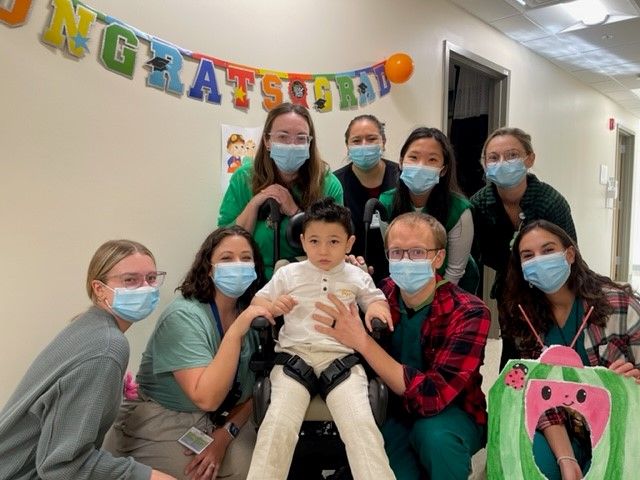Dr. Kathryn Peterson: “It’s Feeding Tube Awareness Week, and we are so proud to honor the hard-working families and children who come to our program. Although feeding tubes are lifesaving, it is important to reduce and eventually eliminate supplemental feedings once the child is medically stable and able to safely consume food and liquid by mouth. We have the most caring, compassionate, and fun team of therapists to help children meet their goals to become safe and happy oral feeders and say goodbye to tube feeds. We couldn’t be prouder of Amer and his family’s hard work and dedication!! Go Amer!!!”
Dr. Dan Mitteer: “Shout out to my wife Dr. Kathryn Peterson, Ph.D., BCBA-D and her talented team for helping another patient remove his feeding tube and now take all calories orally. * Lengthier reflection below *
I’d also like to take a moment to note how empirically supported treatments and well-established techniques, like escape extinction delivered by highly trained behavior analysts, need not be discarded entirely.
The Dalai Lama noted that, “Genuine compassion is based on a clear acceptance or recognition that others, like oneself, want happiness and have the right to overcome suffering.”
Children have the right to overcome suffering–particularly when they are missing critical nutrients and sufficient calories–in a manner that leads to efficient and robust outcomes. As with a surgeon’s scalpel or a dentist’s drill, the localized implementation of escape extinction may not the most appealing to experience or view. We should always be mindful of how we can better improve the quality of the patient during these times, just as a surgeon or dentist works to make things more comfortable for us. However, the precision and efficiency afforded by all of these medically necessary techniques can often lead to more immediate and robust outcomes than less-direct alternatives. As the caregiver herself noted, delays to these obtained effects might have led to “an unknown amount of traumatic NG insertions, ER visits, hospital admissions, infections, surgeries, etc.”
I’ve seen the feeding team work their magic to rid children of scurvy, avoid or remove feeding tubes, reduce failure-to-thrive, and decrease hospital admissions. To me, this is the epitome of being compassionate providers who mitigate the risk of trauma through effective intervention.”


Lara was born premature and experienced silent aspiration as an infant. She started to refuse all attempts at feeding by mouth and experienced growth failure. As a result, her medical team placed a gastrostomy tube when she was 5 months old. When Lara began the intensive feeding program at CSH, she was 2.5 years old, 100% dependent on gastrostomy-tube feedings, and was underweight for her age. Lara also had difficulties with larger volumes of intake from the tube, which led to vomiting and contributed to slow weight gain and growth.
Our Pediatric Feeding Disorders team’s initial goals for Lara were to increase her consumption of a calorie-dense and nutritionally appropriate liquid and of a variety of nutritious smooth-textured foods by mouth. They also focused on gradually increasing her intake to help her learn to tolerate larger volumes without vomiting so that the team could reduce tube feedings. By the end of her intensive admission, Lara was meeting approximately half of her calorie, hydration, and nutritional needs via oral intake. Over the subsequent months, the team reduced and eventually eliminated all tube feedings as she began to consume larger volumes of solids and liquids by mouth.
Today, at age 4.5, Lara no longer receives tube feeds! She is consuming a wide array of smooth-textured foods and drinking larger volumes of various liquids. She’s learning to be more independent during meals, to chew and manage table-textured food safely, and to eat across a variety of settings with family and friends.
Her parents said, “This team was amazing, and we are so thankful that we were given a chance to do this therapy with Lara so we could remove her tube. Lara improved so much since she started the intensive feeding program. We know her eating and drinking is still a work in progress, but we plan to do and follow everything we learned there every day.”
Learn more about the program here: https://ow.ly/At8j50QwvXW
hashtagFeedingTubeAwareness hashtagFeedingProgram

